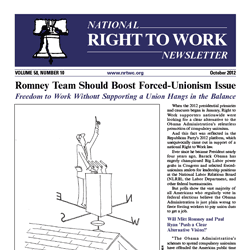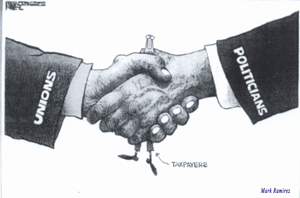It Can get Worse for Workers
Union officials have a key ally in the drive to force more workers to pay union dues for the privilege of working – the National Labor Relations Board, Fred Wszolek argues: Under the Obama Administration, Big Labor has seized control of the National Labor Relations Board (NLRB or Board) to drive its self-interested agenda – a truly unprecedented development in the history of the NLRB. In the past, Board law has changed when control moved from one political party to another. But never before has a Board majority conducted itself in such unprincipled partisan manner, ramming through an extremist agenda and dissembling about it. Three examples demonstrate the point: The NLRB stripped workers of their right to a secret ballot election to challenge their employer’s recognition of a union by card check despite the fact that 25 percent of the elections held resulted in ousting the union. The Board simply declared that the numbers were insufficient to warrant a delay in the commencement of collective bargaining. The Board hurriedly enacted a “quickie” or “ambush” election rule significantly reducing the time between a petition and an election. The rule will limit the ability of employers to express their views on unionization and deprive employees of their right to hear those views and make an informed choice. The NLRB cited a “delay” in holding elections as a reason for the rule even though its own Acting General Counsel reported that Board elections were being held in a “remarkably” timely fashion. The NLRB ignored the National Labor Relations Act (Act) it administers and overturned seventy years of Board precedent to allow a union to organize a minority of the employer’s workforce through tiny bargaining units made up of two or more employees (“micro-unions”). The NLRB sought to downplay the significance of this controversial decision by describing it as “a relatively modest” change” that reflects “decades of Board and judicial precedent.” But, as Board member Brian Hayes said in dissent, it was a “fundamental change” inconsistent with the Act and long-standing NLRB law that would impact “any industry over which the Board has jurisdiction.” But The Worst May Be Yet To Come The Obama Labor Board is now poised to make additional, major changes in the nation’s labor laws, but without a single Republican Board member, like Brian Hayes, having the opportunity to object and express an opposing view. This was made possible by the Obama Labor Board’s elimination of a 63-year-old institutional practice not to issue major decisions without the participation of members from both political parties.





